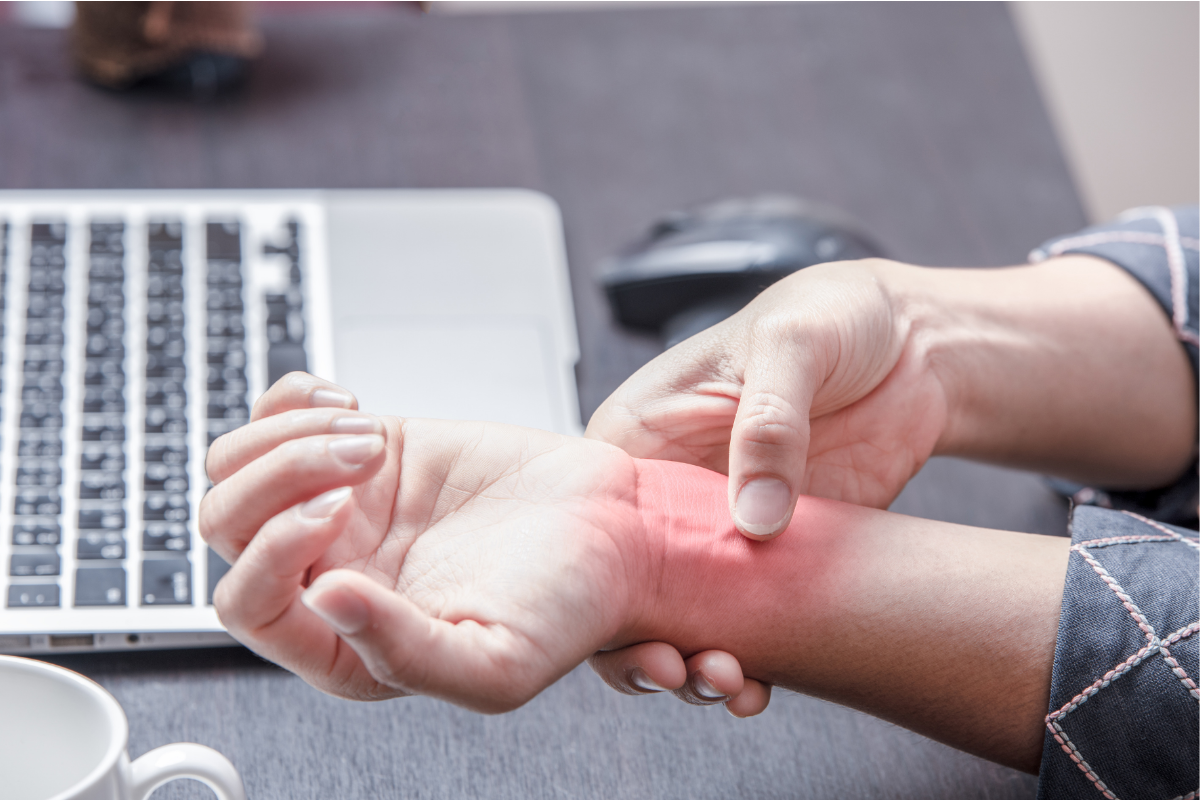

Has this ever been you?
You are at work, trying to ignore the tingling and numbness in your hand and wrist that has been persistent for the past few weeks, maybe even months. Suddenly, you experience a sharp piercing pain that travels from your fingers through to your wrist and up into your arm, ouch! If this sounds familiar to you, you may be suffering from carpal tunnel syndrome. This is a painful condition that usually gets worse over time without treatment. The good news is that physio can help!
What is Carpal Tunnel Syndrome?
Carpal tunnel syndrome is caused by compression of the median nerve and tendons that travel across the wrist and palm. The carpal tunnel is a narrow passageway comprised of the small bones of the wrist, that form the floor of the tunnel and a thick ligament that forms the roof of the tunnel. The median nerve and tendons that bend the fingers pass through this tunnel. Increased compression of the tunnel may lead to pain, tingling, numbness or weakness in the hand and wrist, radiating up into the arm.


Symptoms:
Carpal tunnel symptoms usually start gradually with pain, numbness, tingling or a combination of all three. The numbness and tingling are most often felt in the palm of the hand especially the thumb, index and middle fingers. The symptoms are generally experienced in the dominant hand. Symptoms are often felt at night or upon awakening, as sleeping with a bent wrist can compress the nerve and aggravate symptoms. During the day, symptoms frequently occur with holding a phone, typing, reading, or driving. Initially, symptoms are intermittent but over time they may become constant. Patients report a sense of weakness in their hands coupled with the loss of grip strength and a tendency to drop objects. Moving or shaking the hands often helps to decrease symptoms.


Who is at risk of Carpal Tunnel Syndrome?
The risk of developing carpal tunnel syndrome is common in people that perform repetitive tasks using their hands. Jobs that require you to do lots of typing, manufacturing/assembly line work, sewing and cleaning are all examples. Forceful pinching and gripping i.e., working with vibrating hand tools or handling sports equipment increase the stress on the wrist complex. Hairstylists are also at risk because of the repetitive nature of their work, and the constant gripping of hairstyling tools.
Injury to the wrist in the form of fractures, sprains, dislocations and overuse injuries, e.g. racquet sports injuries, can cause swelling and thickening of the sheath lining the tendons in the carpal tunnel. Fluid retention during pregnancy can cause swelling in the tunnel. Thyroid conditions, rheumatoid arthritis and diabetes can be associated with carpal tunnel syndrome. It is interesting to note that children who spend hours playing computer or video games may be at risk, therefore ensure that they take frequent breaks and do not overdo it.
Carpal tunnel is more common in women than men by a ratio of 3:1 usually between the ages of thirty to fifty years. It is estimated that carpal tunnel affects up to 10% of the population!


What treatment is available?
Physiotherapy treatment includes laser, electromagnetic therapy, acupuncture and ultrasound to reduce pain, swelling, and inflammation. Wrist splints, that hold your wrist in the correct position, are generally recommended. Postural correction, core stability, stretching and strengthening exercises are progressed according to the stages of the condition. Carpal tunnel syndrome should not be left untreated because it can eventually cause permanent nerve damage.
It must be noted that there are other conditions that can cause pain, numbness and tingling in the hand/wrist and arm. A clinical assessment is vital to make an accurate diagnosis and to ensure the correct and effective management.
If you are suffering from carpal tunnel syndrome, call North Vancouver Physiotherapy & Sports Clinic for treatment!

